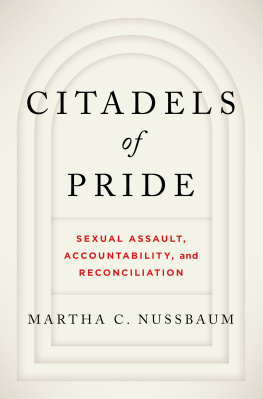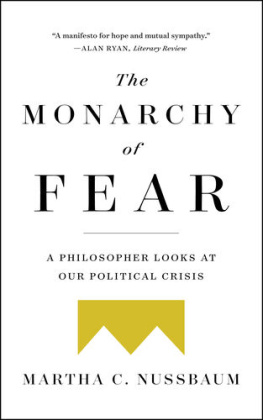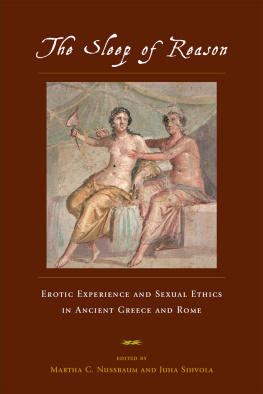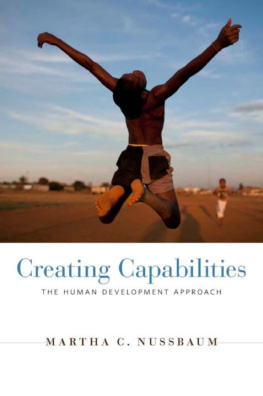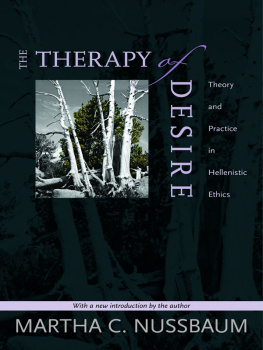Contents
Guide

CITADELS OF PRIDE
Sexual Assault, Accountability, and Reconciliation
MARTHA C. NUSSBAUM

IN MEMORY OF RACHEL NUSSBAUM WICHERT,
19722019
CONTENTS
CHAPTER 1. Objectification:
TREATING PEOPLE AS THINGS
CHAPTER 2. Vices of Domination:
PRIDE AND GREED
CHAPTER 3. Vices of Victimhood:
THE WEAKNESS OF THE FURIES
CHAPTER 4. Accountability for Sexual Assault:
A BRIEF LEGAL HISTORY
CHAPTER 5. Women in the Proud Male Workplace:
SEXUAL HARASSMENT AS SEX DISCRIMINATION
CHAPTER 6. Pride and Privilege:
THE FEDERAL JUDICIARY
CHAPTER 7. Narcissism and Impunity:
THE PERFORMING ARTS
CHAPTER 8. Masculinity and Corruption:
THE SICK WORLD OF COLLEGE SPORTS
CONCLUSION. The Way Forward:
ACCOUNTABILITY WITHOUT MALICE, GENEROSITY WITHOUT CAPITULATION
PREFACE
These are revolutionary times for American women and men. A recent flood of testimony has shown that for generations our society has harbored a culture of sexual violence and sexual harassment. Many, many women have been treated as mere objects for male pleasure and usetheir dignity disrespected, their inner experiences ignored. This very old problem has entered the foreground of public awareness in a new way, challenging all Americans to heed, belatedly, womens long-ignored demand for justice and equal respect. The decency and basic justice of our society hang in the balance.
The information brought out by the #MeToo movement that began in 2017 is not really new. For more than fifty years American women have been telling their stories of sexual violence and workplace harassment in pursuit of justice for all women, and many creative and determined lawyers and policy makers have been working hard to reshape both criminal and civil law to deal more adequately with both sexual assault (a criminal offense) and sexual harassment (defined in our country as a civil offense of sex discrimination under Title VII of the Civil Rights Act of 1964). One objective of this book is to tell that frequently ignored set of stories, so that we understand that Americas march to justice has been long and is the work of many unheralded contributors, not just recent celebrities, valuable though the contributions of the latter have been.
Americas unfinished revolution in sexual equality has made progress over the years, and the #MeToo movement has made yet more progress. There remain, however, significant barriers to full accountability. A second major objective of this book is to pinpoint those areas of recalcitrance and to analyze the reasons why they have resisted reform. Ill be arguing that greed is a major impediment: men who seem irreplaceable and who make a lot of money for other people, especially in sports and in the arts and media, are still likely to be insulated from full accountability, their misdeeds covered up. The federal judiciary is another area in which powerful figures, who often seem indispensable to those whose interests they serve, are similarly insulatedat least until very recently, with reforms as yet far from adequate. Defects in accountability stemming from greed require institutional and structural solutions, and I shall propose some for each area.
Above all, I will argue that the vice of pride is at work in the still all-too-common tendency to treat women as mere objects, denying them equal respect and full autonomy. Pride, as Ill define it, is the vice that consists of thinking that you are above others and that other people are not fully real. This vice can be found at the source of several of the deepest problems in our national life, including racial superiority and privilege, and indifference and disdain on the basis of class. One place where pride surely has ruled is in relations between men and women. Dominant men, refusing women recognition as full and equal people, have resisted the creation of laws that empower women to defend their bodily integrity and assert their agency. And even when, nonetheless, these laws manage to be created, many men resist their sway, creating outposts, citadels of pride, where they avoid accountability.
Like any major social-political revolution, ours is the best of times, meaning a time of budding hopes for full justice. But it is also the worst of times, a time of pain and turbulence, when established patterns have been challenged but people are very unsure about how to go forward, and are often filled with resentments on both sides responding to the injustices of the past and the magnitude of the changes. When Charles Dickens used those two descriptions to characterize the French Revolution, one thing he had in mind was that a push for justice can lead to an outbreak of retributive emotion that does not serve justice well and that actually retards human progress. Our time contains similar dangers, where women and men are concerned. Ours is a time when women speak clearly and proudly, demanding justice and respect. It is also a time when some men react in fear and anger, resenting lost privileges and demonizing feminism as the cause of their discontent. And, sadly, it is also a time when some women not only ask for equal respect but seem to take pleasure in retribution. Instead of a prophetic vision of justice and reconciliation, these women prefer an apocalyptic vision in which the former oppressor is brought low, and this vision parades as justice.
No. Justice is something very different, requiring nuances, distinctions, and forward-looking strategies to bring the warring parties to the table of peace. Ill argue that on this issue as with so many others, retributive emotion is no help. We all need to go forward somehow into a shared future, women and men, and we need to start building that future now, rather than focusing on the infliction of retrospective pain. Thats not to say that part of the institutional solution does not involve punishment of offenders. Punishment is useful, and often necessary, to deter the offender, to deter others from offending, to express societys most important norms, and to educate society as a whole about the importance of good behavior. But punishment accomplishes its legitimate goals only if it is law-based, fair and nuanced, calibrated to the severity of the offense. Our #MeToo moment has seen its share of cases in which punishment has not been nuanced or calibrated, in which mass shaming takes the place of procedural justice. It has also spawned narratives in which reconciliation is dismissed in favor of retributive triumphalism.
Following the lead of both Elizabeth Cady Stanton and Martin Luther King Jr., I shall call for a revolution that fully recognizes the equal human dignity of all people and that moves forward to create a new world, a world in which, as King put it, men and women may live togetherbut lets say women and men, since it is time for Americans to change the customary order of our thinking. In short, this is a book about justice, but a justice that seeks reconciliation and a shared future.
This justice has a central role for law. Law, and the rule of law, embody a vision of equal dignity and fair due process. And though law is finite and its processes flawed, American women have been able to turn to the law, and to legal change, in a way that has not always been possible for women in nations where the law is more deeply flawed and corrupted at its very core. But law does its job well only when people understand it, and in America today people interested in justice for women do not always understand the relevant laws and their background. A large part of my purpose in this book is to describe the relevant areas of law, and their history, clearly, so that any reader who wants to use the law, or to study it further, will be pretty well placed to do so. This will mean that my discussion may at times seem technical, because the impartiality of the law means that it is, in fact, technical, avoiding colorful particulars and personal narratives. Narratives play a role in the evolution of the law, since ours is a common law system in which law develops incrementally through cases, and I shall be telling the stories of some crucial cases. But I want my readers to embrace the larger goal of creating a system that stands for all and is fair to all, standing above any narrative and (or so it should be) immune to bias and favor. So when you think the text is abstract, please try to see that this embodies a noble moral ideal! We have worked hard to win our way past this or that particular story toward a vision of unbiased justice for all; we should not let the natural desire for narrative color betray that struggle. Law in that way embodies a vision of reconciliation: each tells her story, but not just for herself, seeking instead a result that brings all together and stands for all.

